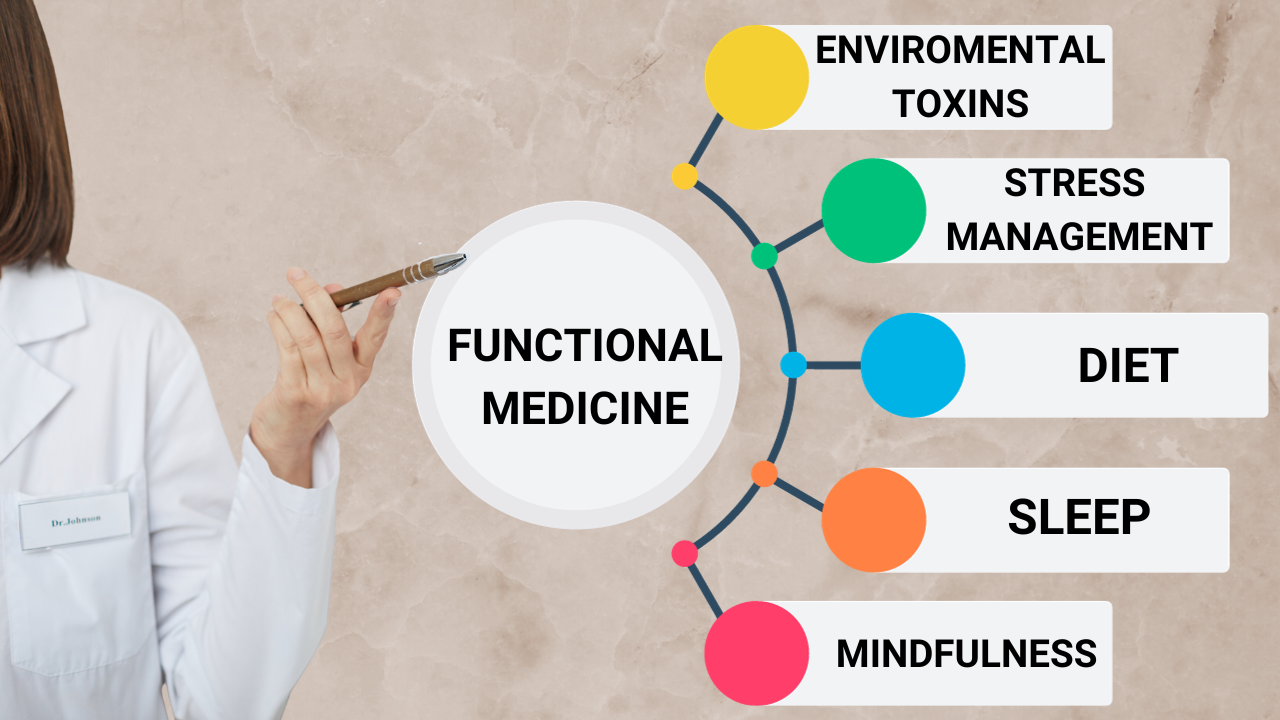
Recently, on my podcast “Your Lifestyle is Your Medicine,” I had the pleasure of interviewing Dr. Lara May, a best-selling author and advanced practice clinical pharmacist with extensive experience helping individuals with type 2 diabetes. This interview sparked my interest in delving deeper into functional medicine and its potential for improving overall health and well-being, especially amidst the alarming rise in chronic diseases, like diabetes, during the pandemic.
Episode 35: How To Treat Diabetes and IBD without drugs? with Dr. Lara May
While traditional Western medicine excels in acute care and symptom management, it often falls short in addressing the root causes of chronic conditions. Functional medicine bridges this gap by taking a personalized, holistic approach that identifies and addresses the underlying imbalances and dysfunctions contributing to illness (1). This systems-based approach considers the interconnectedness of body systems and emphasizes tailoring treatment plans to each individual’s unique biochemical and genetic makeup; in many ways, it is similar to the original philosophy of Osteopathy and lifestyle medicine.
Functional Medicine vs. Alternative Medicine and Naturopathic Medicine
While functional medicine is similar to alternative and naturopathic medicine, its approach is distinct. Traditional alternative medicine systems, like Chinese medicine, focus on restoring energy imbalances (2). Naturopathic medicine, like functional medicine and osteopathy, emphasizes personalized protocols and natural therapies. However, functional medicine differentiates itself through its extensive diagnostic testing, allowing for precise identification of specific imbalances and targeted interventions based on individual needs (3). To me, this is very important, but not for everyone. Some people will need extensive testing to find out the root cause of their problems, but others just need to allow the body’s natural repair mechanism to run unencumbered by the toxins of life.
Dr May’s Journey
Her journey serves as a testament to the power of functional medicine. In the interview, she shared how she had struggled with migraines and IBS for years and how she found relief by eliminating gluten and dairy from her diet, highlighting the effectiveness of individualized dietary interventions in addressing underlying food sensitivities (3). This transformative experience inspired her to become a functional medicine practitioner, empowering her to guide others on their healing journeys.
Functional Medicine for Type 2 Diabetes
For individuals with type 2 diabetes, functional medicine offers a comprehensive approach that goes beyond simply managing blood sugar levels. Deep dive testing like stool analysis and food sensitivity panels helps identify factors like gut dysbiosis or food sensitivities contributing to insulin resistance and metabolic imbalances (3). Based on these findings, personalized protocols incorporating dietary adjustments that target nutrient supplementation (addressing deficiencies in vitamin D or magnesium) and stress management techniques can be implemented to restore metabolic balance and improve overall health (4).
Dietary Considerations:
Food is viewed as medicine in functional medicine. The first step involves evaluating an individual’s diet, assessing nutrient intake, and identifying potential inflammatory or allergenic foods. Low-glycemic index diets or elimination diets can help uncover food sensitivities and optimize blood sugar regulation (5). Factors like meal timing, eating behaviors, and stress levels are considered, as they can impact glucose metabolism.
Supplementation and Nutrient Deficiencies:
Inadequate nutrient intake or absorption can contribute to insulin resistance and diabetes complications. Functional medicine practitioners assess for nutrient deficiencies (e.g., vitamin D, B vitamins) through testing and recommend targeted supplementation to optimize metabolic function. For example, methylated B vitamins may be recommended for individuals with certain genetic variations affecting nutrient absorption (5).
Toxic Burden and Detoxification:
Environmental toxins like heavy metals or mold exposure can contribute to inflammation and insulin resistance. Functional medicine investigates potential sources of toxicity and supports detoxification processes. This may involve testing for mold exposure, heavy metal toxicity, or small intestinal bacterial overgrowth (SIBO). Addressing these underlying issues can support the body’s detoxification pathways, facilitating improved metabolic function and overall health.
Addressing the Whole Person:
Functional medicine acknowledges that well-being extends beyond physical symptoms. Stress management, quality sleep, regular exercise, and mindfulness practices are integral to functional medicine protocols. Meditation and breathwork can help manage stress, while adequate sleep supports hormone balance and glucose regulation (5). Engaging in enjoyable physical activities and incorporating mindfulness practices can contribute to overall well-being and metabolic health.
Conclusion
In many ways, Functional medicine and Lifestyle medicine are similar. Both offer a personalized and evidence-based approach to improving health and well-being by addressing the root causes of illness rather than simply treating symptoms. Both offer dietary adjustments, targeted supplementation, lifestyle modifications, and a focus on the whole person. They empower individuals to take control of their health and experience transformative improvements in their lives. But Functional medicine goes further by offering deep testing for those who don’t respond to more conservative measures.
If you want to use lifestyle or functional medicine to get the root cause of your health issues, reach out to me via ed@edpaget.com, and I’ll book a call to see if I can help.
Disclaimer: The information provided in this blog is for educational purposes only and should not be considered medical advice. Please consult a qualified healthcare professional before changing your healthcare routine.
Sources:
(1) Rakel, D. (2008). “What is integrative medicine? Definitions and core concepts.” Alternative & Complementary Therapies, 14(4), 191-195.
(2) Pizzorno, J. E. (2012). “Integrative medicine: Reflections on past, present, and future.” BMC complementary and alternative medicine, 12(1), 116.
(3) Bjelke, E. W., Akram, S., Belal A. Khan, B., & Wong, H. R. (2017). “The Role of Functional Medicine in the Management of Type 2 Diabetes Mellitus.” Cureus, 9(7), e1291.
(4) Astin, J. A., & Kusek, L. W. (2005). “Complementary and alternative medicine in the United States: Trends and issues.” Health Affairs, 24(3), 852-873.
(5) Bhutani, D., Patel, S., & Valecha, N. (2017). “Lifestyle modifications for the prevention and control of type 2 diabetes mellitus.” Indian J Intern Med, 126(4), 306-312.

Over the last 10 years Ed has been building a YouTube library to help people manage their own pain or movement limitations and increase performance through exercise. He regularly adds videos so be sure to subscribe and visit regularly


"Oh My Gosh- I am ALREADY feeling relief after a few days! I used to wake up 2-3 times a night with shooting pain that anti inflammatories couldn't touch. Now I have been waking up just because I want to notice what it feels like to lay in bed pain free- THANK YOU!."

"When I first started with your program I was experience a lot of pain. Walking was difficult. I had to stop and catch my breath every few minutes and lean against a wall for support. Now when I walk with my husband we go for over an hour. I never had to sit down and stop...and, hardly any pain!!! 😊😊 I can’t thank you enough."
Frustrated that you aren't recovering fast enough?
Discover how to heal from illness and injury using movement, food and lifestyle.